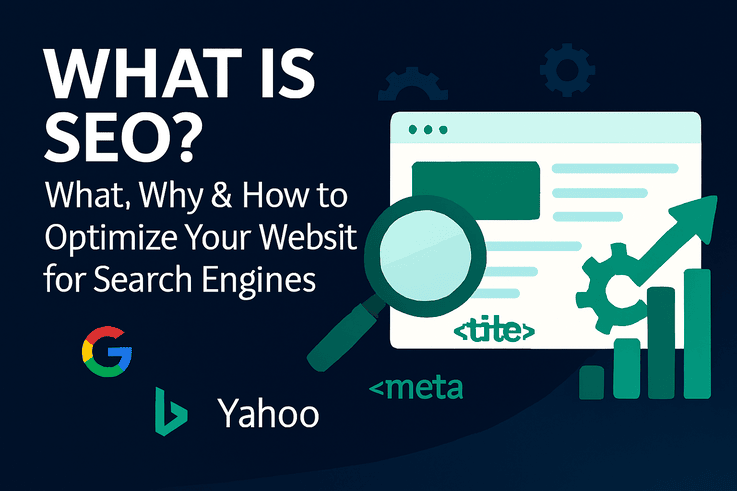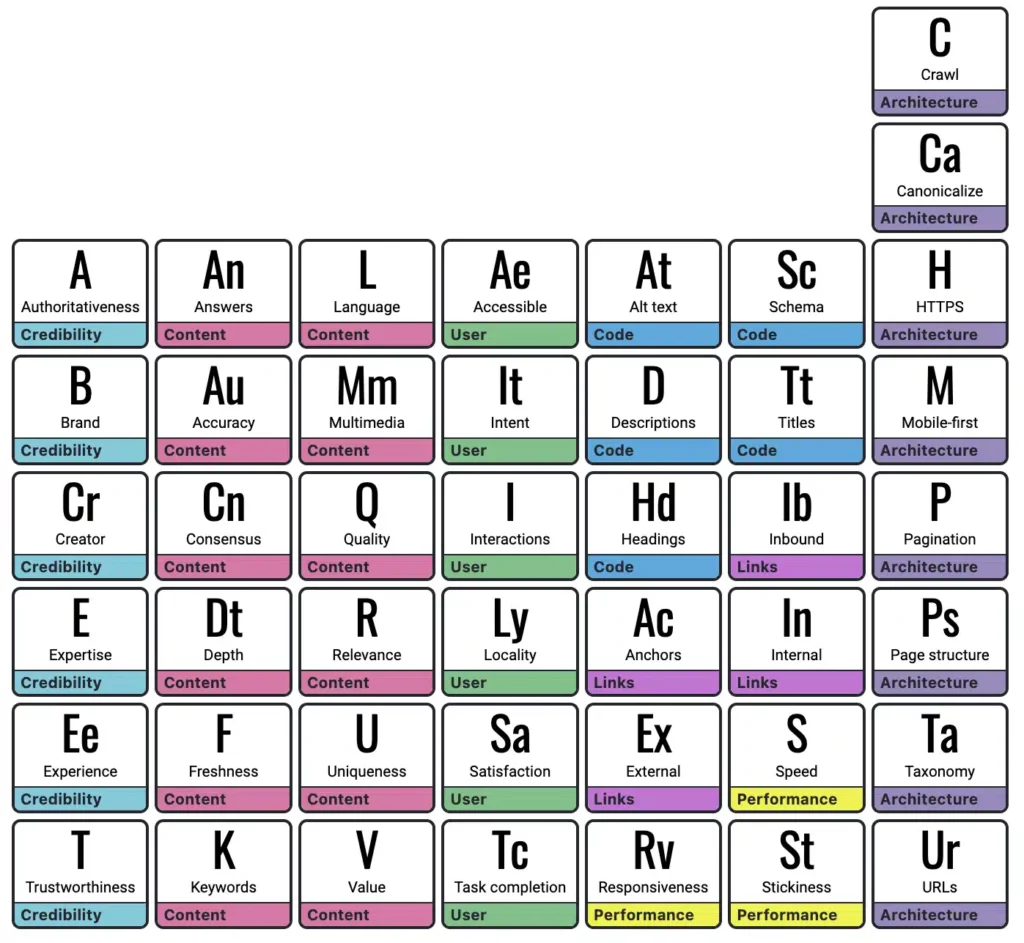
Introduction to SEO
SEO, or Search Engine Optimization, is the practice of improving a website’s visibility in search engine results, like Google or Bing, to attract more organic (non-paid) traffic. It involves optimizing various aspects of a website, including its content, structure, and technical elements, to make it more appealing to both users and search engine crawlers.
Search Engine Optimization (SEO) is the art and science of improving the visibility of a website in organic (non-paid) search engine results. When people search on Google, Bing, or AI-driven search engines, SEO determines whether your website appears on page one or gets buried.
Here’s a more detailed breakdown:
- Goal:To rank higher in search engine results pages (SERPs) for relevant keywords, increasing organic traffic and potentially improving a website’s visibility and authority.
- Key Elements:
- Keyword Research: Identifying the terms and phrases that users are searching for to find information related to your website’s content.
- On-Page SEO: Optimizing individual web pages with relevant content, including titles, meta descriptions, headings, and body text.
- Off-Page SEO: Building a website’s reputation and authority through activities like acquiring backlinks from other reputable websites.
- Technical SEO: Ensuring the website is crawlable and indexable by search engines, including aspects like site speed, mobile-friendliness, and schema markup.
- Importance:SEO is crucial for driving organic traffic, building brand awareness, and increasing the overall success of a website.
- Beyond Search Engines:SEO principles are increasingly relevant on platforms like YouTube and TikTok, where users are also searching for content.
In essence, SEO is a multifaceted process that aims to make a website more user-friendly and search engine-friendly, ultimately leading to better visibility and more organic traffic.
As of 2025, SEO is more than just “adding keywords.” It integrates:
- Technical precision (site speed, structured data, mobile-first design).
- User-first content (answering intent clearly).
- Off-page authority signals (backlinks, mentions, E-E-A-T: Experience, Expertise, Authoritativeness, Trustworthiness).
- AI-driven optimization for AI Overviews, generative answers, and new search paradigms.
According to Google Search Central, SEO is about helping search engines “understand and present content.” In practice, it’s about aligning your site with both algorithmic ranking signals and human expectations.
یہ – آرٹیکل – صرف – ایک – ٹیسٹ – ہے، براہِ -مہربانی -اس – پر – توجہ – نہ – دیں۔

Why SEO Matters in 2025
- Traffic dominance: Over 53% of all website traffic comes from organic search.
- Cost-effectiveness: SEO provides long-term ROI compared to paid ads. While Google Ads charge per click, SEO builds sustainable visibility.
- Trust & credibility: Users trust organic results more than paid ads.
- AI evolution: With AI summaries and generative search, SEO ensures your content appears in answer boxes, featured snippets, and AI overviews.
If your website isn’t optimized, it risks invisibility, regardless of how great your product or service is.
The History & Evolution of SEO
Understanding SEO’s evolution helps marketers adapt to today’s landscape.
- 1990s: SEO begins with early search engines like AltaVista & Yahoo. Ranking depended on keyword stuffing and meta tags.
- 2000s: Google introduces PageRank, using backlinks to measure authority. Black-hat tactics like link farms and cloaking rise.
- 2010–2015: Major algorithm updates—Panda (content quality), Penguin (link spam), Hummingbird (semantic search).
- 2016–2020: Mobile-first indexing, RankBrain (AI), and BERT (contextual understanding) reshape SEO.
- 2021–2023: Core Web Vitals, passage indexing, and the Helpful Content update push user experience and content authenticity.
- 2024–2025: AI Overviews, GEO (Generative Engine Optimization), and anti-parasite updates redefine SEO once again.
Core Pillars of SEO
SEO can be divided into four interconnected pillars:
a) Technical SEO
Making sure search engines can crawl, index, and interpret your website correctly.
Key elements:
- Clean URL structures.
- XML sitemaps.
- Robots.txt optimization.
- HTTPS security.
- Structured data (Schema).
- Core Web Vitals (speed, stability, interactivity).
b) On-Page SEO
Optimizing individual pages for keywords, structure, and engagement.
- Title tags & meta descriptions.
- Heading hierarchy (H1, H2, H3).
- Keyword-rich, semantic content.
- Internal linking.
- Image SEO (alt text, compression).
c) Off-Page SEO
Signals that happen outside your website.
- High-quality backlinks.
- Brand mentions.
- Social media signals.
- Digital PR campaigns.
d) Content & User Experience
SEO is no longer about keywords—it’s about intent satisfaction.
- Answering queries comprehensively.
- Using multimedia (images, videos, infographics).
- Mobile-first design.
- Clear navigation & fast load speeds.
Types of SEO Strategies
SEO strategies can be classified into White Hat, Black Hat, and Grey Hat techniques.
- White Hat SEO: Ethical practices—high-quality content, proper keyword usage, genuine link-building.
- Black Hat SEO: Manipulative practices—keyword stuffing, cloaking, private blog networks (PBNs). High-risk after Google’s updates.
- Grey Hat SEO: A mix—leveraging loopholes without crossing into outright spam.
In 2025, Google’s algorithm is smarter at detecting manipulation. Sustainable growth requires focusing on value-driven White Hat SEO.
Advanced SEO in 2025
Modern SEO includes cutting-edge trends:
- AI-Driven Optimization (GEO): Structuring content for AI answers and summaries.
- Voice Search SEO: Optimizing for conversational queries (“near me,” “best,” “how to”).
- Video SEO: YouTube (Google-owned) is the second-largest search engine.
- Entity-Based SEO: Focusing on topics and entities, not just keywords.
- E-E-A-T: Demonstrating Experience, Expertise, Authoritativeness, and Trustworthiness.
- Zero-Click SEO: Optimizing for featured snippets, People Also Ask boxes, and knowledge panels.
SEO Process: Step by Step
A modern SEO workflow:
- Keyword Research
- Use tools like Google Keyword Planner, Ahrefs, SEMrush.
- Focus on long-tail, semantic, and intent-based keywords.
- Competitive Analysis
- Study top-ranking competitors.
- Identify backlink profiles, content depth, and technical factors.
- On-Page Optimization
- Implement keywords in strategic locations.
- Optimize headings, alt text, and internal links.
- Technical Improvements
- Fix crawl errors in Google Search Console.
- Improve site speed and mobile responsiveness.
- Content Creation
- Publish high-quality, evergreen, and updated content.
- Use structured data for better indexing.
- Link Building & Authority Growth
- Earn links from authoritative sites (guest posts, PR, industry publications).
- Monitoring & Reporting
- Track progress via Google Analytics, Search Console, and third-party tools.
SEO Tools & Platforms
Essential SEO tools in 2025:
- Google Search Console – Crawl/index monitoring.
- Google Analytics 4 – User behavior & traffic insights.
- Ahrefs, SEMrush, Moz – Keyword research, backlinks, competitor analysis.
- Screaming Frog – Site audit.
- Yoast SEO / Rank Math – On-page SEO for WordPress.
- Surfer SEO / Clearscope – Content optimization.
Common SEO Mistakes to Avoid
- Keyword stuffing.
- Thin or duplicate content.
- Ignoring technical SEO.
- Buying spammy backlinks.
- Neglecting mobile-first design.
- Not optimizing for AI-driven search features.
The Future of SEO (2025–2030)
SEO will continue to evolve with:
- Generative Search: AI Overviews will demand structured, authoritative answers.
- Voice & Visual Search: Queries like “show me” and “search by image” will grow.
- Personalized SEO: Algorithms will tailor SERPs to user profiles.
- Ethical SEO: Transparency, fact-checking, and trust signals will matter most.
SEO FAQs
Q1. What is SEO in simple words?
SEO is the practice of optimizing a website to appear higher in search engine results, attracting more free (organic) traffic.
Q2. Is SEO still relevant in 2025?
Yes—SEO remains the backbone of digital visibility, especially with AI-driven search evolution.
Q3. How long does SEO take?
Typically 3–6 months for noticeable results, depending on competition and resources.
Q4. What are the 3 main types of SEO?
Technical SEO, On-Page SEO, and Off-Page SEO.
Q5. Is AI replacing SEO?
No—AI is reshaping SEO, not replacing it. Optimization now includes AI Overviews and generative search strategies.
Bottom line:
SEO in 2025 is a multi-dimensional, AI-aware discipline that combines technical foundations, quality content, authority building, and UX design.
It’s no longer about tricking algorithms—it’s about earning trust and relevance in a crowded digital landscape.
Brands that embrace generative engine optimization (GEO), ethical authority-building, and user-first content strategies will dominate SERPs in the coming years.